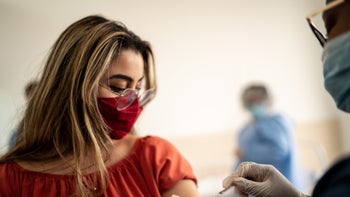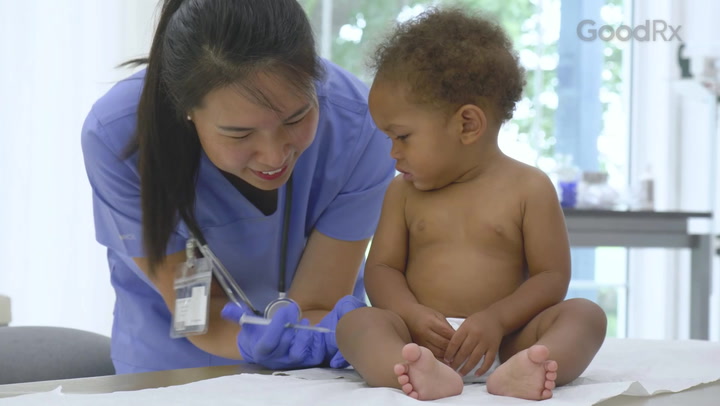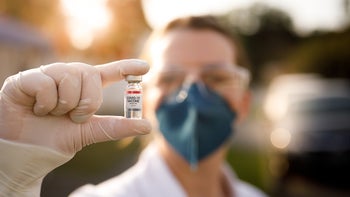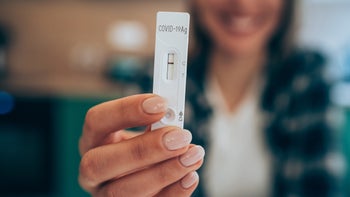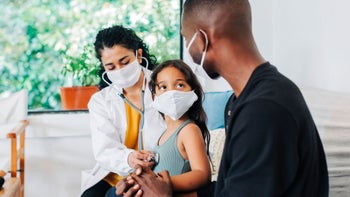
Is It Safe to Get the New COVID Vaccine While You Have COVID Infection?
Key takeaways:
The CDC recommends that everyone over 6 months old get the updated 2024-2025 COVID-19 vaccine — even people who had a breakthrough case of COVID.
But wait to get the new vaccine if you have active symptoms of a COVID infection. You can get the updated shot after your symptoms improve and you no longer need to be isolated.
The updated vaccine may be more effective if you wait 3 months from the start of your last COVID infection to get the shot.

Seasonal spikes in COVID have become the new normal. To help protect people from the latest COVID strains, the updated 2024-2025 COVID vaccines have been released by Moderna, Pfizer, and Novavax.
You’ll hear some people call these latest vaccines “boosters.” Technically, though, they’re updated vaccines that target the most recent strains of the virus. They’re more effective than a booster shot that would simply increase the immunity from a previous vaccine. The Moderna and Pfizer vaccines are formulated to target KP.2, an omicron subvariant. The Novavax vaccine targets JN.1.
So, if you’re planning to get the updated vaccine, what happens if you get sick with COVID just before your appointment? Chances are you have some questions about timing. How do you best time your COVID shot? And, if you think you could have an active COVID infection, should you get the vaccine now or wait?
SHINGRIX (Zoster Vaccine Recombinant, Adjuvanted) is now $0 for almost everyone*
Get SHINGRIX at the pharmacy or in-network doctor’s office today. 98% of privately insured people pay $0 and all Medicare Part D beneficiaries pay $0 at the pharmacy.
Prescribing Information
*Coverage and cost may vary and are subject to change without notice. Reimbursement decisions are made by individual insurance plans.


SHINGRIX is an FDA-approved vaccine for the prevention of shingles (herpes zoster) in adults 50 years and older. SHINGRIX is not used to prevent chickenpox.
• You should not receive SHINGRIX if you are allergic to any of its ingredients or had an allergic reaction to a previous dose of SHINGRIX
• An increased risk of Guillain-Barré syndrome (severe muscle weakness) was observed after vaccination with SHINGRIX
• Fainting can happen after getting injectable vaccines, including SHINGRIX. Precautions should be taken to avoid falling and injury due to fainting
• The most common side effects are pain, redness, and swelling at the injection site, muscle pain, tiredness, headache, shivering, fever, and upset stomach
• SHINGRIX was not studied in pregnant or nursing women. Tell your healthcare provider if you are pregnant, plan to become pregnant, or are breastfeeding
• Vaccination with SHINGRIX may not protect all individuals
• Ask your healthcare provider about the risks and benefits of SHINGRIX. Only a healthcare provider can decide if SHINGRIX is right for you
You are encouraged to report vaccine adverse events to the US Department of Health and Human Services. Visit www.vaers.hhs.gov to file a report, or call 1-800-822-7967.
For US audiences.
Trademarks are property of their respective owners.
©️2024 GSK or licensor.
PMUS-SGXWCNT240015 May 2024
Produced in the USA.
GoodRx Health information and resources are reviewed by our editorial staff with medical and healthcare policy and pricing experience. See our editorial policy for more detail. We also provide access to services offered by GoodRx and our partners when we think these services might be useful to our visitors. We may receive compensation when a user decides to leverage these services, but making them available does not influence the medical content our editorial staff provides.
When to get your updated vaccine if you’ve tested positive or have symptoms of COVID
The CDC recommends waiting to get your updated COVID shot if you’ve recently tested positive for COVID infection or have COVID symptoms. The latest CDC criteria say you should stay home until your symptoms are improving and you’ve had no fever for at least 24 hours.
Exactly how long should you wait before getting the vaccine? If you’re positive for COVID infection or have COVID symptoms, you should at least finish your recommended isolation period before getting the updated vaccine. That’s because you’re more likely to infect others while you still have a fever or your symptoms aren’t improving.
If you have moderate or severe symptoms of COVID, you should wait until you’re fully recovered before getting the vaccine.
How long should you wait to get a COVID booster after you’ve had COVID?
The CDC says that after a COVID infection, you can get the COVID shot when:
Your symptoms have improved.
You’ve isolated for the recommended period of time.
The CDC doesn’t provide a recommendation for the exact best time after infection to get the vaccine. But it says that you may consider delaying your COVID vaccine by 3 months after a COVID infection. Immunity from an infection can last several months or longer. But you could be infected sooner if a new variant starts circulating.
All about COVID-19 immunity: Learn how long it takes for the COVID vaccine to work and how long immunity lasts after vaccination or infection.
Combining COVID and flu vaccination: Some people find it convenient to get their COVID and flu shots at the same time. Here’s what to expect.
COVID vaccine side effects: Most COVID vaccine side effects are mild and brief. Here’s what to expect and how to manage them.
The CDC recommends that you might want to get your COVID vaccine sooner rather than later if you:
Have a higher risk of severe disease
Have regular close contact with someone at high risk of severe disease
Live in a location with high rates of hospitalization due to COVID
Think that the circulating COVID variants are different from the strain in the latest COVID vaccine
To help you figure out the timing that makes the most sense for you, you can check in with your doctor’s office to decide what’s best for you.
What happens if you get a COVID vaccine while you test positive for COVID?
You may get infected with COVID right before or after your updated shot. Here’s what you need to know:
If you accidentally get vaccinated during a COVID infection, you may get more intense side effects from the vaccine. That’s because some COVID symptoms and vaccine side effects can feel quite similar.
The shot will still work to boost your immune system the way it’s supposed to.
COVID vaccines start to provide immunity within 2 weeks after the first shot. Researchers are still trying to figure out when you get peak immunity.
What if you get the updated vaccine while you’re sick (but COVID negative)?
You can still get vaccinated if you have symptoms of a cold and you test negative for COVID. Mild illness, like a stuffy nose or headache, won’t affect how well the COVID vaccine works, according to the CDC. And the vaccine won’t make the mild illness worse. But you might feel like you’re having worse side effects after the vaccine because the vaccine side effects and cold symptoms can be similar.
If you choose to get the updated COVID vaccine while you’re sick, wear a mask to the vaccine site. This is to protect yourself and others — even if your COVID test is negative.
Who needs an updated COVID shot this season?
The CDC recommends that everyone 6 months old and older get the updated 2024-2025 COVID vaccine. The number of doses you need and the timing depends on a couple of things. Let’s take a closer look.
Everyone ages 5 years old and up
If you had an earlier version of the COVID vaccine, get 1 updated COVID Moderna or Pfizer vaccine at least 2 months (8 weeks) after your last COVID shot. If you’ve never been vaccinated, you just need 1 dose of the Moderna or Pfizer 2024-2025 updated vaccine.
The Novavax vaccine is available for people 12 years of age and older. If you haven’t had a COVID vaccine before the 2024-2025 season, you’ll need 2 doses, at least 3 to 8 weeks apart. If you’ve had any previous COVID vaccines, you just need 1 dose of the updated vaccine.
The CDC updated its guidance for older adults and people who are moderately to severely immunocompromised. They recommend that these people get a second dose of the updated vaccine 6 months after their first shot.
Children ages 6 months to 4 years old
The number of doses young children need depends on which brand they get and whether they were previously vaccinated.
Unvaccinated children ages 6 months to 4 years old
Here are the recommendations:
Moderna: Young children need to get 2 doses of the updated Moderna vaccine. They can get the second dose 4 to 8 weeks after the first.
Pfizer: Young children need to get 3 doses of the updated Pfizer vaccine. The second dose is 3 to 8 weeks after the first. The third dose is 8 weeks after the second.
Children ages 6 months to 4 years old who got 1 previous COVID vaccine
Here are the recommendations:
Moderna: Young children who got 1 previous Moderna COVID vaccine should get 1 updated Moderna vaccine 4 to 8 weeks after the last dose.
Pfizer: Young children who got 1 previous Pfizer COVID vaccine should get 2 updated Pfizer vaccines. The second dose is 3 to 8 weeks after the first. The third dose is 8 weeks after the second.
Children ages 6 months to 4 years old who got 2 or more previous COVID vaccines
Here are the recommendations:
Moderna: Young children who got 2 or more previous Moderna COVID vaccines should get 1 updated Moderna vaccine 8 weeks after the last dose.
Pfizer: Young children who got 2 or more previous Pfizer COVID vaccines should get 1 updated Pfizer vaccine 8 weeks after the last dose.
Can you strengthen your immune system before getting a COVID vaccine?
The best way to strengthen your immune system to fight COVID infection is to get vaccinated against COVID. Some healthy lifestyle choices might also help make that COVID vaccine even more effective. Your body’s immune cells may work better if you:
Get plenty of quality sleep. Getting a good night’s sleep may help your body have a better response to the COVID vaccine.
Eat a nutritious diet. Following a balanced and nutritious diet can keep your body working at its best.
Address any vitamin deficiencies. Some vitamin deficiencies — like vitamin B6, zinc, and iron — have been linked to a lower response to vaccines in general. A small study looked at women with low vitamin D levels. When they got vitamin D supplements before the COVID vaccine, they developed higher antibodies to COVID than women who didn’t get supplementation.
Stay physically active. Some evidence suggests that regular physical exercise can boost your response to the COVID vaccine.
Have a positive mindset toward the vaccine. An intriguing study looked at the relationship between people’s beliefs about COVID vaccines and their immune response. Researchers found that people who believed that side effects were a sign that the vaccine was working had a higher antibody response to the COVID vaccine 6 months later.
Is the updated COVID vaccine worth it (even if you may still get COVID)?
Yes. Vaccines help prevent people from getting infected. Here’s what studies show about the benefits of the COVID vaccine:
The updated COVID vaccine provides a strong immune response against the latest COVID variants. Getting the vaccine makes it less likely that you’ll need to be hospitalized or see a healthcare professional if you get COVID after vaccination.
If you get a COVID infection after vaccination, you’re more likely to be able to recover at home.
Vaccination is still the best tool to prevent severe illness, hospitalization, and death from COVID infection.
The COVID vaccine may lower severity and duration of long COVID.
The bottom line
The 2024-2025 COVID vaccine targets the latest COVID variants. Everyone 6 months old and older should get the updated shot. The timing and the number of doses depends on your age and how many COVID shots you’ve had in the past. But many people who want to get the updated COVID vaccine may also have symptoms of or test positive for COVID. If that’s the case for you, you can delay your COVID shot by a few weeks to a few months.
Even if you’ve had COVID already, you should still get your updated vaccine once it’s safe for you to do so. That’s because vaccinations continue to train your immune system to protect you against severe disease from COVID and long COVID. Getting vaccinated also helps protect others in your community.
Why trust our experts?



References
Centers for Disease Control and Prevention. (n.d.). Variant proportions.
Centers for Disease Control and Prevention. (2024). CDC recommends second dose of 2024-2025 COVID-19 vaccine for people 65 years and older and for people who are moderately or severely immunocompromised.
Centers for Disease Control and Prevention. (2024). COVID-19 vaccine basics.
Centers for Disease Control and Prevention. (2024). COVID-19 vaccine frequently asked questions.
Centers for Disease Control and Prevention. (2024). COVID-19 VIS.
Centers for Disease Control and Prevention. (2024). People with certain medical conditions and COVID-19 risk factors.
Centers for Disease Control and Prevention. (2024). Respiratory virus guidance.
Centers for Disease Control and Prevention. (2024). Staying up to date with COVID-19 vaccines.
Centers for Disease Control and Prevention. (2024). Vaccines when your child is sick.
Cesur, F., et al. (2023). Impact of vitamin D3 supplementation on COVID-19 vaccine response and immunoglobulin G antibodies in deficient women: A randomized controlled trial. Vaccine.
Collie, S., et al. (2023). Association between regular physical activity and the protective effect of vaccination against SARS-CoV-2 in a South African case–control study. British Journal of Sports Medicine.
Goldberg, S. A., et al. (2023). Viral determinants of acute COVID-19 symptoms in a nonhospitalized adult population in the pre-omicron era. Open Forum Infectious Diseases.
Guevarra, D. A., et al. (2024). Examining the association of vaccine-related mindsets and post-vaccination antibody response, side effects, and affective outcomes. Brain, Behavior and Immunity – Health.
Prather, A., et al. (2024). Impact of sleep and timing of vaccination on neutralizing antibody responses to the COVID-19 vaccine. Sleep.
Rayman, M. P., et al. (2021). Optimising COVID-19 vaccine efficacy by ensuring nutritional adequacy. British Journal of Nutrition.
Rosen, A. (2024). What to know about the updated COVID vaccine for fall, winter 2024–25. John Hopkins Bloomberg School of Public Health.
Tran, V. T., et al. (2023). Efficacy of first dose of covid-19 vaccine versus no vaccination on symptoms of patients with long covid: Target trial emulation based on ComPaRe e-cohort. British Medical Journal Medicine.
U.S. Food and Drug Administration. (2024). FDA approves and authorizes updated mRNA COVID-19 vaccines to better protect against currently circulating variants.
Van Werkhoven, C. H., et al. (2023). Early COVID-19 vaccine effectiveness of XBB.1.5 vaccine against hospitalization and ICU admission, the Netherlands, 9 October - 5 December 2023. medRxiv.
Wu, S., et al. (2024). Protection of prior SARS-CoV-2 infection, COVID-19 boosters, and hybrid immunity against Omicron severe illness: A population-based cohort study of five million residents in Canada. Public Library of Science One.


